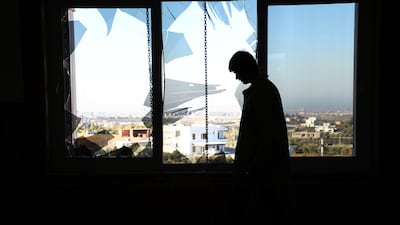It is a bitter irony that Iraq’s Kurdistan region – the most stable part of the country – was among the Iraqi and Syrian territories hit by Iranian forces in Monday night’s ballistic missile attacks that claimed at least five civilian lives. This centre of relative stability has been struck in attacks before and it will endure, but such a worrying escalation with the targeting of civilian homes with ballistic missiles, at a time of extreme regional volatility poses a serious question: what can be done to stop it?
Iran’s Islamic Revolutionary Guard Corps claimed responsibility for the attacks on the Kurdistan region capital of Erbil and in northern Syria. The Iranians claimed targets included a base hosting US military personnel and a “Mossad headquarters”; the IRGC said it was aiming for ISIS and other militant groups in Syria, according to comments carried by state media. The Iranian government has been searching for a way to respond to the Israeli assassinations of IRGC, Hamas and Hezbollah figures in addition to the ISIS attack in Kerman that killed nearly 100 people close to the tomb of Iranian general Qassem Suleimani.

However, just as Israel’s campaign of cross-border strikes and assassinations are particularly reckless at a time when the region teeters on the brink of wider conflict, the same is true of the IRGC’s violent agenda. American forces have contributed to this volatile mix as well, with drone strikes on targets across the region seeding anger in many Arab populations.
It is in no one’s interests for further escalation to take place, and although those who plan and execute such strikes may think they are taking part in a clinical, retaliatory war, the risk is that their operations provoke a reaction that cannot be contained. An example of this is Gaza, where Hamas’s October 7 attacks sparked a chain reaction that is still playing out, with incredible suffering of Gazans, in addition to the Red Sea where Iran-aligned Houthi rebels have started a full-blown international crisis with their attacks on shipping. Civilians are dying and bearing the brunt of all these attacks.
Regional governments and organisations, as well as the wider international community, seem largely unable to contain this deadly game of cat and mouse, and must do better. Although the issue of Palestine is somewhat tangential to this shadowy conflict involving Israel, Iran, its proxies and extremist militants, ending the current Israeli operation in Gaza – thereby removing the issue as a driver of conflict – would be a welcome first step. China’s recent proposal to convene an international peace conference – and its support for a two-state solution – is an intervention worth examining given the paucity of solutions coming from the international community.
But as governments, militants and proxies continue to use Iraq and Syria, as well as long-suffering Lebanon and Yemen, as a chessboard upon which to pursue regional ambitions and vendettas, the number of near misses, such as that seen in Iraq and Syria on Monday night, continue to grow. The danger posed by supposedly surgical strikes is that they can end up killing the patient.

